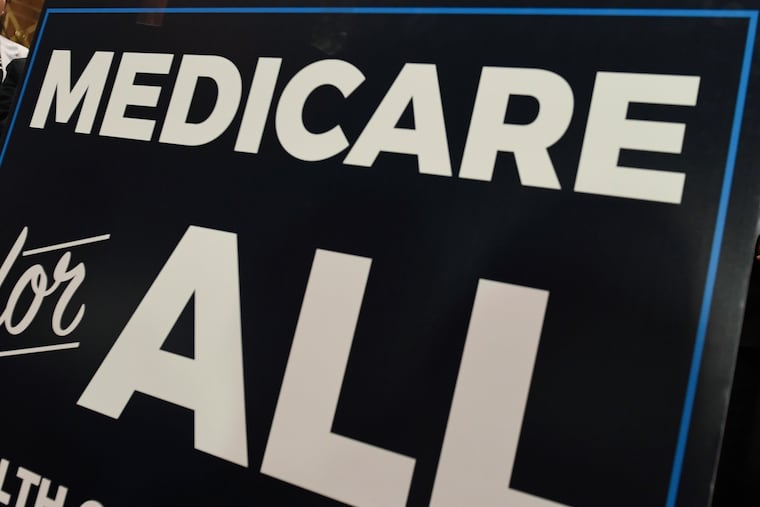It isn’t enough to label Medicare-for-All as socialism. We need solutions, not slogans.
The anger over care restrictions and insurance payment limitations is growing. People want a better system. ,

“They’re socialists who are going to destroy the economy!” That is the rallying cry of those opposing Medicare for All. Unfortunately, political slogans are not real-world solutions. What is needed is a discussion about the efficacy of the Medicare/Health Care for All proposals. If they are indeed threats to the economy, alternatives must be proposed.
In simple terms, socialism is an economic theory where the government owns the means of production. But there are few pure socialistic nations. Forms of capitalism and socialism exist side by side in political systems ranging from democracies to dictatorships.
Consider China. Large segments of its economy have capitalistic elements. Yes, there is private ownership in a communist state.
As for the United States, while most means of production are privately owned, there are many segments where the government exerts massive control. Medicare is an example. The government oversees and funds the provision of medical care for seniors who use the system, even though most of the services provided are privately owned.
That is true for many other goods and services. With national defense, education, police and fire protection, social services, and public infrastructure, the government determines what should be produced, pays for the goods, and through contracts, selects the providers of the goods.
What we have is a modified economic system where private and government elements coexist.
Is that mixture good? In theory, a purely capitalist/competitive system has the potential to create the most goods and the greatest wealth.
But we don’t have a purely capitalist system. The government intervenes in markets, regulates businesses, picks winners and losers through specialized tax breaks, and as noted, determines and pays for a wide variety of goods and services.
And there is nothing that shows those government actions create the most goods, the most wealth, or the best distribution of income.
Consequently, people try to change the distribution of goods, services, and wealth through the political process. Those who can influence government actions can modify the distribution of income in their favor.
The current movement for Medicare for All is an attempt to do just that. As health-care costs soar, growing numbers of households are being priced out of the system or forced into lesser-quality insurance, limiting their quality and quantity of care.
The anger over care restrictions and insurance payment limitations is growing. People want a better system, but unfortunately most people cannot afford the cost. So, they are looking to the government for help.
Medicare has been proposed as an alternative structure for providing the needed quantity and quality of health care for everyone. This is a government-run insurance structure where care is provided by the private sector. There are private-sector alternatives and add-ons that make this a mixed public/private sector system.
One big advantage of using the Medicare system as a base is that it more effectively controls spending per enrollee than private insurance. (See “Slow Growth in Medicare and Medicaid Spending per Enrollee Has Implications for Policy Debates,” by John Holahan and Stacey McMorrow, Urban Institute, February 2019.) So much for government inefficiency.
A number of Health Care/Medicare For All models have been proposed. One is full government control of all elements of care and funding. This is the single-payer model, where the government or a quasi-government agency finances health care.
Health-care costs would be shifted from personal and business insurance plans to government and paid for by taxes on individuals and businesses. When people say socialism, this is the model they are attacking.
A second option is to mirror the current Medicare public/private insurance and provider structure. Everyone would be eligible but would not be required to use the system. Again, business and personal health insurance costs would decline significantly. If you like Medicare, it is hard to criticize.
Would implementing either alternative mean we would have socialized medicine? Not really. Regardless of the option, care would still be provided by the private sector, not the government.
The difference is that there would be a huge countervailing force to the health-care companies – the government – since it would be financing much of the care. There would be greater regulations and the tax structure would have to change to help pay the bills.
The debate should be about whether these proposals would or could provide universal health care at a reasonable cost.
Those who object to the Health Care/Medicare for All options need to provide alternatives. It may be fun to use political slogans to attack proposals. Name-calling does generate lots of heat. But it sheds little light on the solutions.
The skewing of the distribution of health care is creating massive discontent. We know Medicare is efficient and effective in providing health care to seniors. The challenge to the Medicare for All naysayers is to offer a better way to provide universal health care. So far, they have failed to do that.